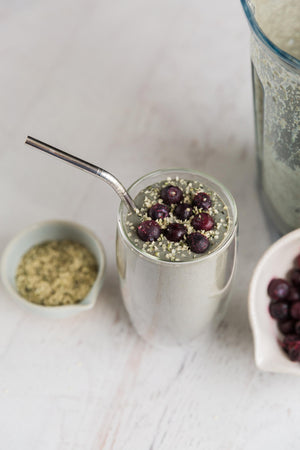Our mitochondria generate the majority of the chemical energy needed to power the cell's biochemical reactions. They are responsible for normal cellular function, including intracellular metabolic activities and signal transduction of various cellular pathways.
In other words, the mitochondria are responsible for creating energy to drive cellular function and all of our biological processes. Depending on the cell you may have hundreds of thousands to millions of mitochondria per cell. The more important and energy dependent the cell the more mitochondria. It's estimated that ovarian cells have 600,000 mitochondria per cell and that a brain cell can contains 2 million mitochondria per cell so it's no surprise that scientists are exploring potent nutrients to support mitochondria as an anti-aging strategy.
Researchers have looked at ways to boost the mitochondria, including diets rich in nutrient-dense whole foods, time-restricted eating windows, and more recently supplementation. Two of which are UA and NAD+, both powerful nutrients that play a significant role in cellular energy production and cellular aging. UA and NAD+ are currently being studied for their benefits regarding longevity, proper metabolic function, and increased energy levels. These nutrients are essential for creating energy and supporting the health of the mitochondria, but their function within the cells is very different.
A recent publication by Timeline Nutrition takes look at the difference between these two nutrients and the benefits of supplementing them to achieve optimal health. I am always looking for ways to optimize my health and share that knowledge with others. I have personally taken NAD+ through IV infusions, transdermal patch from The Hydration Room, and 0.3mg subcutaneous injections prescribed by my functional MD, all have resulted in an amazing boost of energy for ~4 hours but subcutaneous has been my preferred delivery.
What is NAD+?
Nicotinamide adenine dinucleotide, or NAD for short, is a cofactor needed for our mitochondria to produce energy from the food we eat. NAD+ is made in the body from the B3 family of vitamins niacin, nicotinamide, and nicotinamide riboside. Research has recognized that NAD+ is a key player in other important chemical reactions, including those related to the aging process. NAD+ levels decline as we age, and this decline is associated with many age-related chronic conditions. Trials are underway to see if boosting NAD levels could be used as an anti-aging treatment or therapy for age-related chronic conditions. NAD boosters are supplemented orally with NAD precursors or through IV infusions. Although the studies show promising results and I have personally experienced the benefits of NAD+ boosters, access and availability to these resources is limited to a small majority.
The process of removing damaged mitochondria called mitophagy, by which the mitochondria are recycled and revitalized for better performance, is critical for maintaining proper cellular functions. Although NAD+ is critical in energy metabolism, only UA directly addresses mitochondrial aging by optimizing mitophagy.
What is Urolithin A?
Urolithin A (UA) is a powerful post-biotic converted from the polyphenolic compounds found in pomegranates, berries, and walnuts. UA is not directly available to us through the food we eat, instead it is metabolized by our microbiome and converted into UA. Research shows that only about ⅓ of the population can convert these precursor molecules into UA[1]. Those who can produce UA may not be able to make an adequate amount to experience the health benefits. Therefore, research suggests that supplementation, such as Mitopure, ensures you get an effective dose of UA. This highly researched, clinically proven supplement is the latest breakthrough in optimizing cellular health.
Benefits of Urolithin A:
- Cardiovascular Health: Our heart requires mitochondria to produce a steady stream of energy to keep it beating, requiring healthy and efficient mitochondria for optimal heart health. Pre-clinical trials suggest that taking Urolithin A may help protect the heart from damage and improve cardiovascular risk factors.
- Muscular Health: Supplementation with Urolithin A has been clinically proven to improve muscle function in older adults[2]. Additionally, research in mice suggests that supplementation with UA may improve muscle function by increasing NAD+ levels and ATP output. This supports blood vessel function for better blood supply to the muscles that need it.[3]
- Neurodegenerative disease: Several pre-clinical studies have shows UA may be protective against diseases of the brain and nervous system, with an emphasis on treatment of conditions such as Alzheimer's disease, Parkinson's disease, and multiples sclerosis. The Buck Institute for Research on Aging is currently investigating the effects UA could have on preventing or even reversing Alzheimer's disease.
- Metabolic Disease: The risk of metabolic disorders, including high blood sugar, insulin resistance, and type 2 diabetes, are among the most prevalent diseases we face worldwide as rates of obesity continue to climb. Several pre-clinical trials show a positive effect with using UA to help protect against metabolic dysfunction, improving insulin sensitivity and blood glucose levels, and could be a powerful tool in the treatment of diabetes.[6]
- Increased Life Span: Pre-clinical trials have found that UA can significantly extend lifespan in rodents and worms. Although more research is required on the effectiveness of UA and longevity in humans, scientists have the groundwork to study safe and effective treatments to help humans live longer, healthy lives.
How Mitopure Works
Mitopure is a science-backed supplement conveniently packaged into a precise dose of purified Urolithin A. UA produces a mitochondrial recharge, allowing older, damaged mitochondria to be recycled and regenerated into newer, healthier ones. The mitochondrial theory of aging suggests that mitochondrial decline is a key contributor to aging and the development of chronic disease. So optimizing how our mitochondria performs with UA supplements could be the key to slowing down the aging process.
In addition, other benefits of supplementing UA include increased cardiovascular and muscular health, may provide defense against Neurodegenerative and metabolic disease, and increased life span. The ongoing research suggests that UA is a groundbreaking solution to some of our most unanswered health concerns.
There are no head-to-head studies comparing the effectiveness of Urolithin A vs. NAD+ supplementation. However, in regards to accessibility and based on our understanding of the important role mitophagy plays in cellular health, prioritizing the renewal process before supporting the energy-making process seems to be a great first step in recovering and enhancing our mitochondrial function. In conjunction with the fact that most of us cannot produce adequate amounts of Urolithin A on our own, using a supplement like Mitopure would be beneficial to the general public.
References
[1] Singh A, D’Amico D, Andreux PA, et al. Direct supplementation with Urolithin A overcomes limitations of dietary exposure and gut microbiome variability in healthy adults to achieve consistent levels across the population. Eur J Clin Nutr. Published online June 11, 2021:1-12. doi:10.1038/s41430-021-00950-1
[2] Liu S, D’Amico D, Shankland E, et al. Effect of Urolithin A Supplementation on Muscle Endurance and Mitochondrial Health in Older Adults: A Randomized Clinical Trial. JAMA Netw Open. 2022;5(1):e2144279. doi:10.1001/jamanetworkopen.2021.44279
[3] Ghosh N, Das A, Biswas N, et al. Urolithin A augments angiogenic pathways in skeletal muscle by bolstering NAD+ and SIRT1. Sci Rep. 2020;10(1):20184. doi:10.1038/s41598-020-76564-7
[6] D’Amico D, Andreux PA, Valdés P, Singh A, Rinsch C, Auwerx J. Impact of the Natural Compound Urolithin A on Health, Disease, and Aging. Trends in Molecular Medicine. 2021;27(7):687-699. doi:10.1016/j.molmed.2021.04.009
Raimundo AF, Ferreira S, Tomás-Barberán FA, Santos CN, Menezes R. Urolithins: Diet-Derived Bioavailable Metabolites to Tackle Diabetes. Nutrients. 2021;13(12):4285. doi:10.3390/nu13124285








